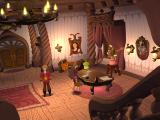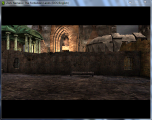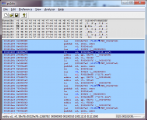Summer of Code/GSoC Ideas 2019
If you'd like to get involved in ScummVM - or one of our sister projects, such as ResidualVM - we'd love to help you get started!
We've had a lot of successful student projects as part of Google's Summer of Code in previous years -- we hope to inspire you to work with us and (hopefully) add your own success.
We often get asks by students with no experience with ScummVM whether they have the necessary skills to participate with us. The idea of GSoC is to introduce students to open source development, so we are not expecting you to have experience with ScummVM. You will have time during the application and community bonding periods to familiarize yourself with the project. The technical skills required to work with us varies from task to task. For any work on ScummVM, you'll probably need to already be comfortable with a basic level of C++. Some of the tasks might need more specialized knowledge (for example, working with ResidualVM may need you to understand some OpenGL and 3D math, and some engine tasks may require some assembly or reverse engineering knowledge); we give our thoughts about this alongside each suggested task, below.
Most importantly, we'd like you to join our community. There are many previous GSoC participants who are still involved in our project, and whether or not you participate as part of Summer of Code, we'd love for you to get involved too.
You should come to our IRC Channel and introduce yourself! We're friendly, and it's often the easiest way to ask questions about the tasks and the code in general. The channel is the main form of everyday communication for the project, and there will almost always be developers there who can discuss your project ideas, answer questions and help out.
You can find more information about what we expect from you before you apply at GSoC Application.
Introduction
We have a list of potential tasks further down on this page, but before you look at them, perhaps you'd like to take a look at some of the successful projects from previous years! We encourage all of our students to maintain a blog during their summer work, which is a nice way to get some sense of what they accomplished.
One popular type of task is to improve our support for the games you love, whether this means a new game engine, or helping us to perfect an existing one.
Sometimes source code is available - in recent summers, students integrated code supporting games such as Sfinx (blog), The Prince and the Coward (blog) and Avalanche (blog) into ScummVM. In fact, our support for the Wintermute engine was not only started by a GSoC student (blog), who integrated the code into our tree, but also drastically improved by another student a year later (blog).
A more challenging (but hopefully rewarding) idea is to start (or continue) reverse engineering a game where no source is available. Two good examples are the pair of students who drastically improved ResidualVM's support for Escape from Monkey Island (blog, blog), and the work on improving Operation Stealth (blog). Another option is to work on merging (and improving) someone else's reverse engineering work, such as was done with the ZVision engine (blog).
If you'd prefer to improve ScummVM more directly, there are even more options available there; in the past, students have (to give some examples) improved our OpenGL support, added a testing framework (blog), improved our scaler code (blog), written a new GUI framework, added loadable modules for embedded platforms (blog), rearchitected our keyboard input code (blog) and added support for high-colour (16bpp and above) graphics. It's difficult for us to imagine ScummVM as it was before some of these projects, you can make a huge difference!
Tasks
General contacts: Our IRC channel, our mailing list, or contact sev, John Willis, Arnaud Boutonné
The ideas here are meant to be just that - ideas. We hope they help inspire your proposals, but you should also consider suggesting your own completely new project ideas. Pick something you really want to see improved/fixed, and come and talk to us about it!
If you're looking for more inspiration for ideas, beware of our TODO (and the other TODO lists linked from there) and our OpenTasks pages. Many of the tasks listed there might be incomplete or outdated, or too difficult for a new developer. The best thing to do is to come and talk to us!
Game Tasks
Technical contacts: Our IRC channel, our mailing list, or contact sev, John Willis, Arnaud Boutonné, Filippos Karapetis,
If you already have reverse engineering experience, you could consider working on one of the external in-development game engines, or even on support for a new game. However, doing this kind of work is very difficult and time-consuming - you would have to convince us that you have the necessary skills to actually be sufficiently productive, probably by demonstrating some actual progress first.
If you don't feel quite up to that level of challenge, we have lots of other suggestions:
Macromedia Director
Technical contacts: sev
Difficulty level: Medium. You'll need a reasonable level of programming experience, and probably some Director games.
Many 90s-era adventure games were developed using the Macromedia (now Adobe) Director tool. It would be nice to be able to play these games in ScummVM! We have a WIP engine in ScummVM tree, but it requires much more work in order to implement all hundreds of Lingo commands.
Networking code for Moonbase Commander
Technical contacts: sev
Difficulty level: Medium. You'll need a reasonable level of programming experience, and some network development experience.
Moonbase Commander is a SCUMM-based strategy game. The original supported up to 4 network players. We have the source code for the original game, but it is based on top of Microsoft DirectPlay. We need to do a clean reimplementation, not necessarily compatible with the original. It may also require some basic server side for discovery. The networking libraries libcurl and SDL_Net are already part of ScummVM.
Wintermute 3D
Technical contacts: Einar Johan Trøan Sømåen, Paweł Kołodziejski
Difficulty level: Medium/hard. You'll need to be able to understand 3D graphics, and rearchitecture/design the relevant parts of the engine.
In 2012, support for games using the Wintermute engine was merged into ScummVM, but it still lacks support for games which use 3D graphics. It would be great to be able to play these games in ResidualVM!
ResidualVM project. See Wintermute 3D for more details.
In Cold Blood engine refactor
Technical contacts: Einar Johan Trøan Sømåen, Paweł Kołodziejski, Joost Peters
Difficulty level: Medium/hard. You'll need to be able to understand the relevant parts of the engine.
ResidualVM project. See ICB engine refactor for more details
Maupiti Island
Technical contacts: Strangerke
Difficult level: Medium to Hard. Good knowledge of C++ and some knowledge of Pascal and Assembly are required. Some knowledge of French could also help a bit, though Strangerke could translate anything on demand.
Maupiti Island is the sequel of Mortevielle Manor, both released by Lankhor. Both games were best sellers at the time and were games of the year in France. Nevertheless, best sellers of the time were still selling low volumes and Maupiti Island is nowadays pretty rare ans unknown.
Partial Pascal sources of Maupiti Island (Atari ST) have been secured recently. Some utility functions are missing, which were written using a mix of Pascal and assembly. So, the whole harcoded logic is available with most of the utility functions. Some reverse engineering may be required if the equivalent functions in Mortevielle are not working out of the box for the DOS version.
The purpose of this task is to reimplement a Maupiti Island engine for the DOS variants of the game in at least two languages, using Mortevielle Manor and the original sources as documentation.
Hyperspace Delivery Boy
Technical contact: sev or DJWillis
Difficulty level: Medium to hard. Good knowledge of C++ and some knowledge of Lua are required.
Hyperspace Delivery Boy if a game written by (between others) John Romero after he left ID Software. The games has been ported to multiple platforms and is somehow a zelda like, mixing RPG, action and puzzles.
The original sources have been secured. they are written in C++ and Lua.
The purpose of the task is to write an engine for ScummVM of the Windows version. Sword25 engine is also written using Lua and could be used as an example of how to proceed.
Mission Supernova games
Technical contacts: Strangerke or Criezy
Difficulty level: Medium. Good knowledge of C++ and basic knowledge of C and ASM is required. Some knowledge of German language would also help.
There were several adventure games by Steffen Dingel, which are freeware now: http://outpost.simplicity.de/ Among them were Mission Supernova and Mission Supernova 2.
We got hold of the original source code written in C with some x86 assembler and Mission Supernova was ported to ScummVM and translated to English as part of GSoC 2017. We now need to rewrite the second game as well in a portable C++ and polish its English translation.
The Immortal
Technical contacts dreammaster or Strangerke
Difficulty level: Hard. Good knowledge of C++ and assembly (x86 or 68K or 6502) is required.
The immortal was released in 1990 by Electronic Arts. It's a mix of genres involving RPG elements with action and puzzles. The gameplay is different one variant to the other, and all variants are written in assembly, making it more difficult to support all the variants.
In 2018, a GSoC student picked this task but, due to personal issues, didn't manage to complete the task. The purpose of the task is therefore to implement an engine for a variant of the game, using the original sources and the work of JoeFish as a documentation.
Bring your own Adventure or RPG
Technical contacts: Talk to us on IRC, or send us an email.
Difficulty: Hard. You'll need good knowledge of C++, as well as knowledge of (reading) assembly.
Our project consists of re-implementations of classic games, and we have listed a number of potential new game engines that you could work on here on our ideas page. However, you may have a classic 2D Adventure game or Role Playing Game (RPG) you are interested in yourself that is suitable for ScummVM that you would like to reverse engineer and re-implement. If so, great!
Adding a completely new game engine is not easy, and you will have to convince us that you are aware of the challenges involved, that the game you are interested in is feasible, and that you have the necessary skills. Preferably, you will already have done some preliminary investigation, into for example data file formats, disassembly, etc.
Please come talk to us to see if we have a mentor who would be interested in working with you on such a game. We'd be happy to help out.
Infrastructure Tasks
Finally, there's always plenty of other practical tasks on our wishlist!
Improve Android port
Technical contacts: Sev
Difficulty level: Medium/hard. You'll need some knowledge of C++, Java and ideally Android development and OpenGL. Access to at least one Android device is probably also necessary.
Our current Android port is in need of improvement, especially combined with modern versions of Android. We'd like to improve the GUI and the input code in particular, but hopefully you also have your own ideas if you've tried the port (if you haven't: do so!). There are some patches already available, and it should be possible to merge code from other projects (such as SDL 2). A native configuration GUI could also be an option.
Game packaging system
Technical contacts: sev or DJWillis
ScummVM offers 8 freeware games for download, but they need to be downloaded and installed manually. It would be great to develop a universal system which would let us descibe a game, e.g. provide screenshots, game descriptions, metadata, and package it for different platforms, so we could put them to different applicaiton distribution systems.
Examples are: Linux packages, Google Play, Apple App Store, Steam, ForgeTV store, and anything beyond that.
Support for shaders and arbitrary scalers
Technical contacts: sev
Difficulty: Medium
ScummVM uses software scalers for graphics enhancements. In 2012 we were running GSoC for turning them into plugins. That work needs to be completed, basically, it is just rebasing of the patch. The rebasing was started here: https://github.com/digitall/scummvm/tree/gsoc2012-scalers-cont
Modern systems often have OpenGL with shader support. RetroArch project shaders are standard for them in open source gaming. LordHoto started work on adding support for those to ScummVM. His unfinished work could be found here: https://github.com/lordhoto/scummvm/tree/libretro-shader
We need to add both improvements to our scaler system. Recent PSP2 port already adds some basics for scalers, particularly in GUI, so that could be reused too.
We need to have it tested on desktops and at least Android, but preferably also Windows and iOS.


